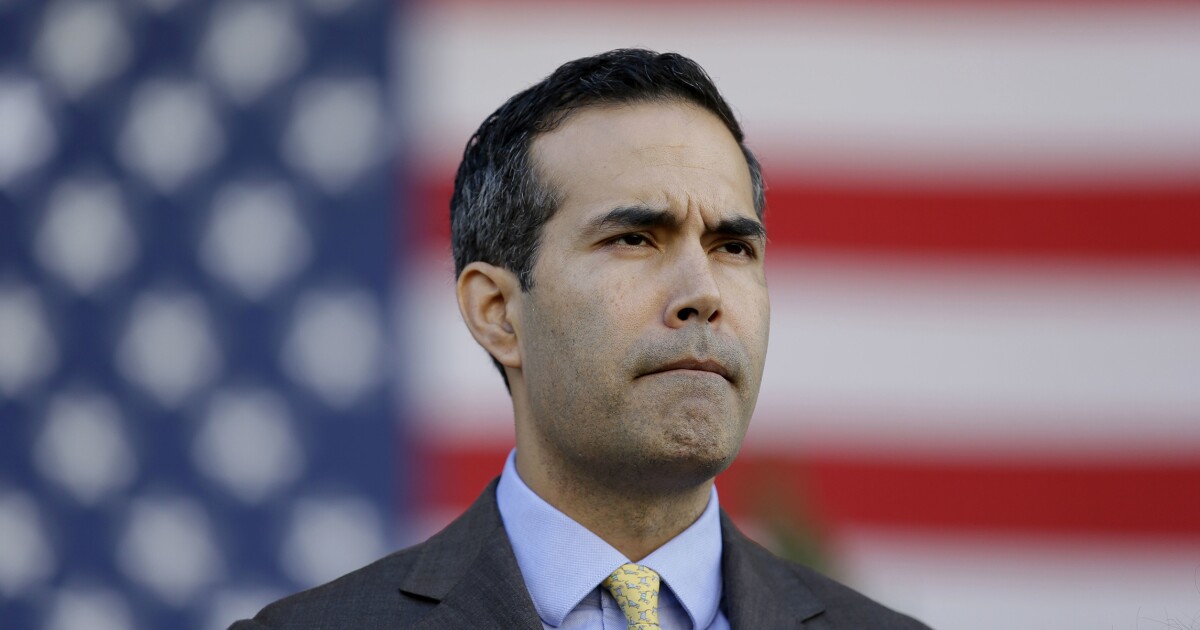

It was just one Republican primary.
Well, OK, a runoff, and it was just for one state office in Texas: state attorney general — not insignificant but not exactly a guaranteed stepping stone to the Senate or the White House. But the losing candidate in this primary runoff was named George Bush — Texas Land Commissioner George P. Bush, to be precise.
Bush is only 46 years old, meaning he has a potentially bright political future ahead of him, despite his loss Tuesday to scandal-plagued Texas Attorney General Ken Paxton, should he choose to stay active in politics and run for office again in the coming years. Still, Bush’s defeat begs the question: After decades of dominating the Republican Party, has the family dynasty that produced one senator, one member of the House of Representatives, two governors, one vice president, and two presidents hit the end of the line?
That’s the assumption that has accompanied Paxton’s 68%-to-32% romp over Bush, who will leave office early next year after two four-year terms as Texas’s elected statewide land commissioner. On its face, the assumption is not wholly unwarranted.
The rise of former President Donald Trump as the preeminent figure in Republican politics has precipitated the fall of the Bush family’s (and its allies’) influence in party affairs. The GOP has become more blue-collar and working-class, rejecting the conservative traditionalism of the Ronald Reagan era embodied by the Bush clan and embracing the pugilistic conservative populism practiced by Trump and his adherents. For good measure, George P. Bush isn’t the only Bush to lose a primary of late.
EX-NEW YORK CITY MAYOR BILL DE BLASIO DECLARES CONGRESSIONAL RUN
His cousin Pierce Bush was turned away by Republican voters two years ago in the race for the nomination in suburban Houston’s 22nd Congressional District. Had Pierce Bush been successful, he would have followed in the footsteps of his grandfather, former President George H.W. Bush, who in the late 1960s and early 1970s represented a Houston seat in Congress. Still, you’ll forgive me if I check my priors.
Even during all those years we now think of as dynastic for the Bush family, they hardly experienced success in a straight line. There were setbacks, plural, during which it was not always clear they amounted to any dynasty at all. To review: George H.W. ran for Senate in 1964 — and lost. He ran for Senate again in 1970 — and lost again. His 1980 presidential campaign also fell short, although his fortunes were revived when Reagan selected him as his running mate.
However, since President Franklin Delano Roosevelt, just three presidents have been ousted after just one term, and Bush is one of them, losing reelection in 1992. Only with the hindsight of history was Bush reevaluated and deemed the successful patrician statesman of a consequential political dynasty.
No doubt, the label was easier to apply after his failure to win reelection as president was followed by the election of one son — George P. Bush’s father, Jeb Bush — as governor of Florida and the election of another son, George W. Bush, as governor of Texas and president just eight years after his father’s defeat. And even George W. Bush stumbled along the way, losing his bid for a Texas congressional seat in 1978.
So maybe George P. Bush marks the end of the line for his family’s dynasty that began with his grandfather, Sen. Prescott Bush (R-CT), who was in office for 10 years starting in November 1952. But who knows … maybe not. Now, to the field.
- Alabama Senate race. Don’t look now, but Rep. Mo Brooks (R-AL) isn’t dead yet. The congressman advanced to a June 21 runoff with Katie Britt after finishing second Tuesday in the Alabama GOP Senate primary. Brooks received 29.2% of the vote. But it was enough to force a round two because he held Britt, former chief of staff to retiring Sen. Richard Shelby (R-AL), under 50% (she garnered 44.7% of the primary vote.)
Despite losing round one to Britt by 15 percentage points, Brooks has to feel good about where he stands nine weeks after Trump pulled his endorsement of the congressman and proceeded to kick him while he was down. The presumption, then, was that Brooks would come in third and end his congressional career in ignominy. That was the case partly because Brooks was running such a lackluster campaign.
But since Trump kicked the congressman to the curb, he seems revitalized — and he no doubt prospered from the concerted advertising campaign that sought, ultimately successfully, to keep military veteran and businessman Mike Durant from overtaking Britt. Leading in the polls until recently, he ran third, finishing with 23.3% of the vote. With a four-week runoff campaign now underway, Alabama Republicans are asking: What will Trump do next?
-
Trump watch. The analysis and speculation surrounding Trump and his machinations inside the Republican Party are endless and sometimes overwrought. For instance, as Republican strategist Doug Heye quite ably notes in this piece, campaigns and candidates matter. Trump’s endorsement is an opportunity to succeed; it’s not a golden ticket.
But every rule has an exception, and what happened in Georgia’s Republican primaries this week is just that. The former president laid it all on the line to oust Gov. Brian Kemp, as well as Secretary of State Brad Raffensperger and other incumbent Republicans running for state office. And Trump framed his intervention in those campaigns as payback for what he claims was Kemp and Raffensperger turning a blind eye to rampant voter fraud that cost him Georgia’s electoral votes and put President Joe Biden in the White House.
Well, Kemp won, easily dispatching Republican primary challenger former Sen. David Perdue by 50 percentage points, and Raffensperger survived, too, even avoiding a runoff. That’s not simply a function of better candidates and better campaigns — that’s a former president, who, however beloved by Republican primary voters, just found out that love has its limits.The consequences could prove rather significant over the next 18 months.
CLICK HERE TO READ MORE FROM THE WASHINGTON EXAMINER
- 2024 Watch. Sen. Tim Scott (R-SC) is headed to Iowa next month. The South Carolina Republican is slated to appear with Sen. Joni Ernst (R-IA) and headline a Republican reception in Cedar Rapids. Another Scott has been grabbing more attention recently: Sen. Rick Scott (R-FL), chairman of the National Republican Senatorial Committee and a possible 2024 contender.
But Tim Scott, whose star in the GOP is rising, is considered bona fide presidential material in his own right and is known to be eyeing a White House bid. In that context, his trip to Iowa is interesting. Scott’s social conservatism and pulpit-preacher style could be a great fit for the Hawkeye State, where evangelical voters often hold sway in the quadrennial presidential caucuses, the first contest on the Republican nominating calendar.




